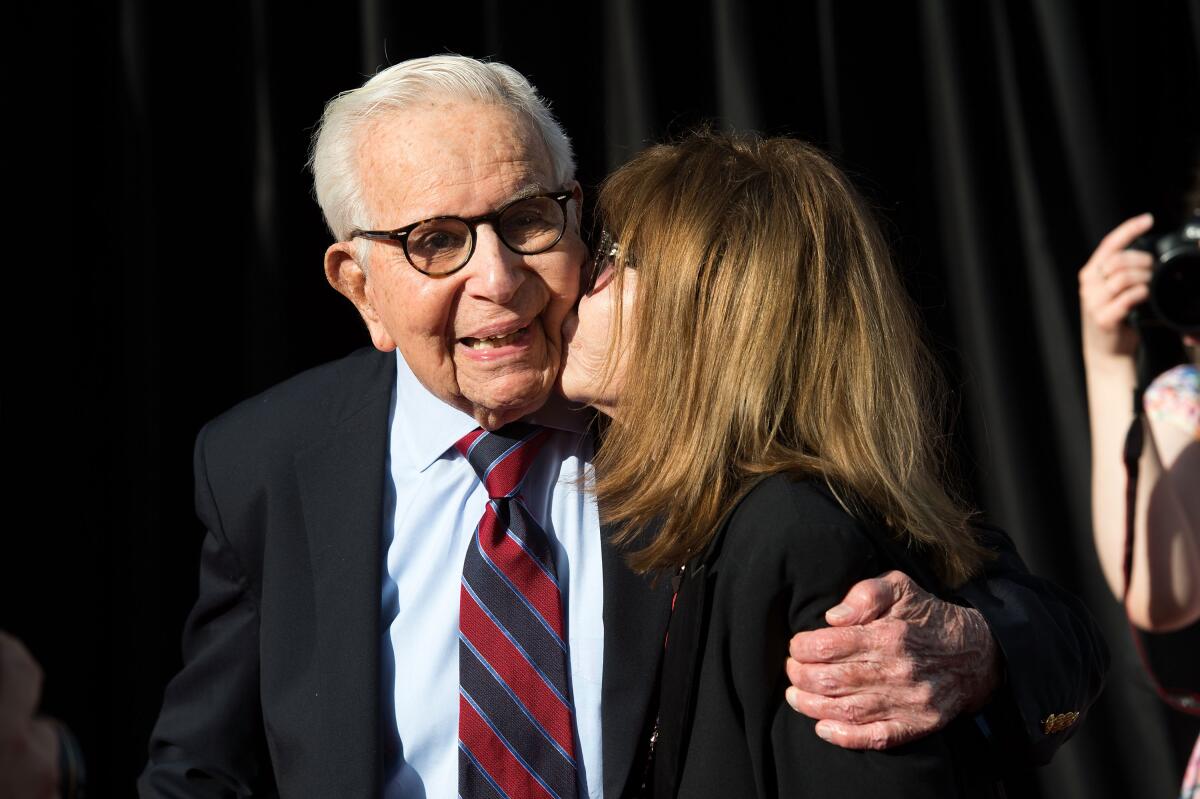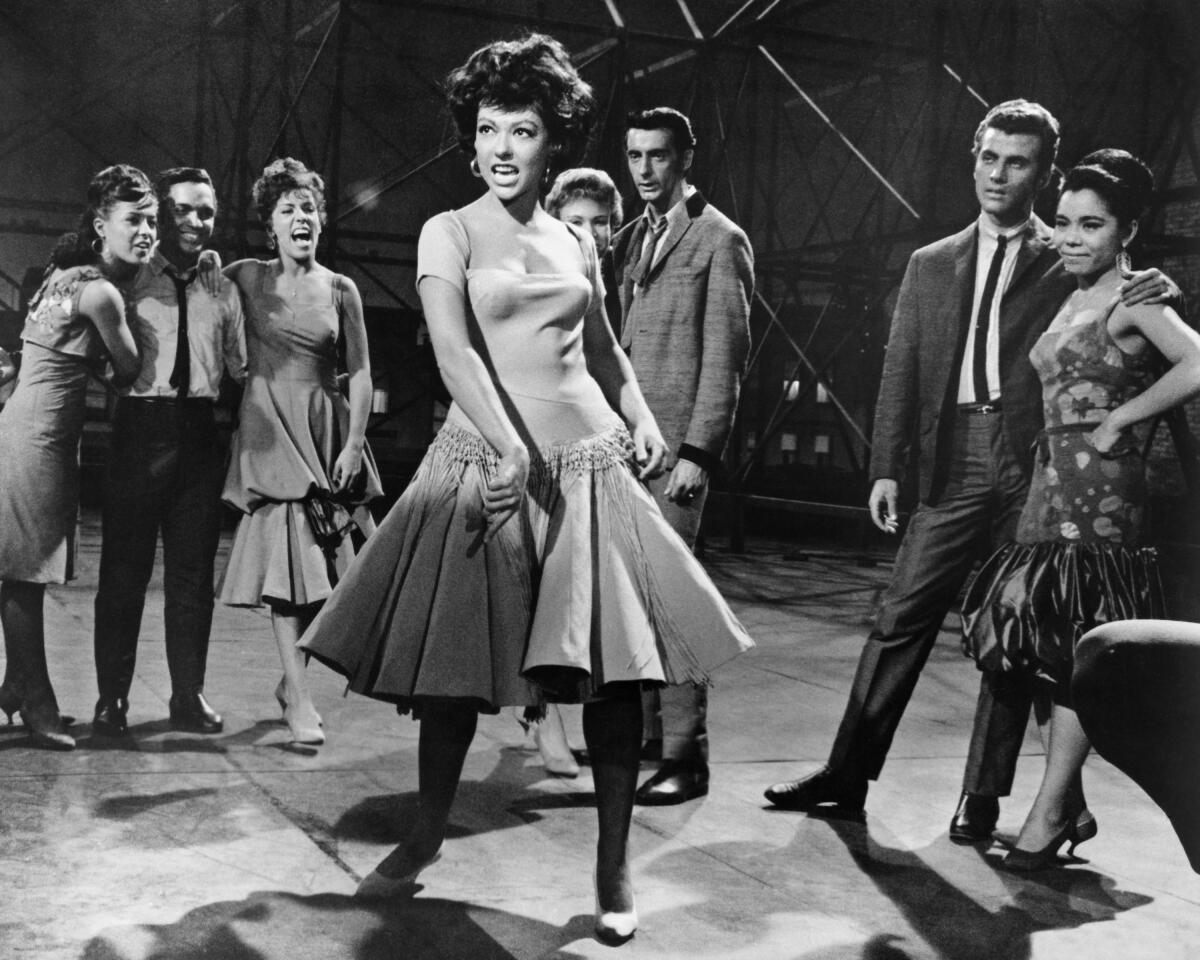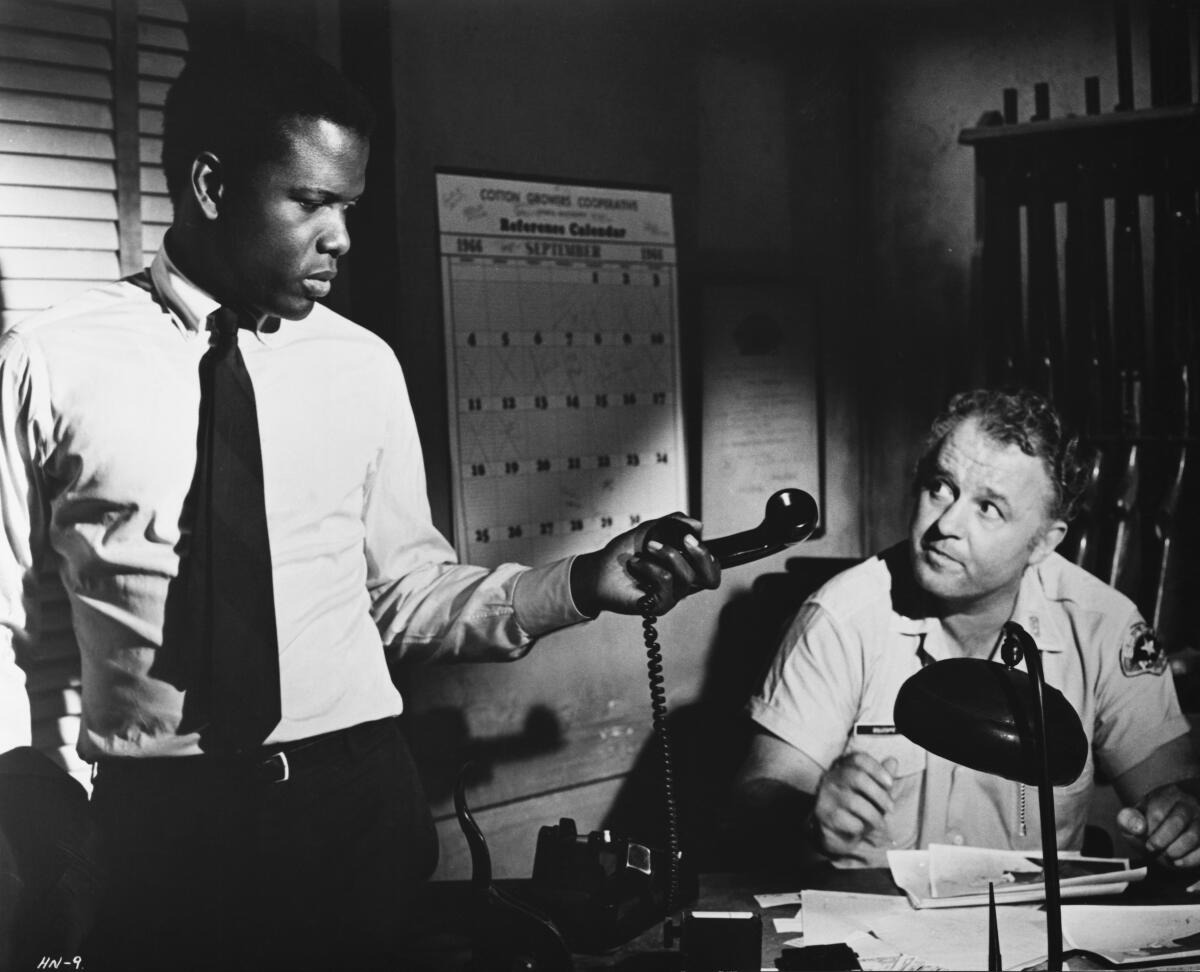Walter Mirisch, former motion picture academy president and legendary producer, dies at 101

Walter Mirisch, the last of three Mirisch brothers who produced or oversaw production of a string of highly regarded films in the 1950s and ’60s, including best picture Oscar winners “The Apartment,” “West Side Story” and “In the Heat of the Night,” as well as comedy classics like “Some Like It Hot” and “The Pink Panther,” has died. He was 101.
Mirisch, who also was a strong presence in the Hollywood community and served as president of the Academy of Motion Picture Arts and Sciences from 1973 to 1977, died Friday in Los Angeles of natural causes per an academy statement.
For the record:
6:08 p.m. Feb. 25, 2023An earlier version of this article cited incorrect dates for some of the awards Walter Mirisch and his films received. “West Side Story” swept the Academy Awards in 1962, not 1961; “In the Heat of the Night” won the Oscar for best picture in 1968, not 1967; and Mirisch received the Jean Hersholt Humanitarian Award in 1983, not 1988. The article also stated that Sidney Poitier played a lawyer in “The Heat of the Night.” He portrayed a police detective.
“The Academy of Motion Picture Arts and Sciences is deeply saddened to hear of Walter’s passing,” academy Chief Executive Bill Kramer and academy President Janet Yang said in a statement. “Walter was a true visionary, both as a producer and as an industry leader. He had a powerful impact on the film community and the Academy, serving as our President and as an Academy governor for many years. His passion for filmmaking and the Academy never wavered, and he remained a dear friend and advisor. We send our love and support to his family during this difficult time.”
In all, films with the stamp of brothers Walter, Harold and Marvin Mirisch garnered dozens of Oscar nominations. The tiny “studio without walls,” as Harold Mirisch called it, grew and contracted as needed and was so much a family operation that the brothers were sometimes called “the Mirii.” They were among the very first “independents.”
The storied Hollywood producer, who’ll be at an American Cinematheque screening, has authored ‘I Thought We Were Making Movies, Not History.’
“I don’t know that there’s been a brother team that’s done as much for this industry as the Mirisch brothers,” veteran Paramount producer A.C. Lyles once said.
Mirisch films earned dozens of honors including best director nominations for Billy Wilder (“Some Like It Hot,” “The Apartment”), Robert Wise (“The Sound of Music,” “West Side Story”), Jerome Robbins (also “West Side Story”) and Norman Jewison (“In the Heat of the Night,” “Fiddler on the Roof”). Jewison’s “The Russians Are Coming! The Russians Are Coming!,” the first of several films he directed and/or produced with the Mirisches, also received a best picture nomination.

The Mirisches also worked with many other acclaimed directors, including John Ford (“The Horse Soldiers”), John Sturges (“The Magnificent Seven,” “By Love Possessed,” “The Great Escape”), George Roy Hill (“Toys in the Attic,” “Hawaii”), John Huston (“Sinful Davey”) and Blake Edwards (“The Pink Panther”).
Actors, too, fared well in Mirisch films, including Rod Steiger, the best actor Oscar winner in 1967 for “In the Heat of the Night,” and George Chakiris and Rita Moreno, who won Academy Awards for supporting roles in the 1961 screen version of Broadway’s “West Side Story.”
Generally speaking, Harold Mirisch was the wheeler-dealer with the big Hollywood personality, Marvin was the quieter money man and Walter took the greatest interest in the artistic side of filmmaking.
I Thought We Were Making Movies, Not History alter Mirisch University of Wisconsin Press: 450 pp., $29.95
As C. Robert Jennings wrote of the Mirisches in the Los Angeles Times in 1967, directors loved working with them because the brothers took care of “an awesome miasma of agents, properties, screen rights, salaries, star temperaments, contract negotiations, lawsuits, legal clearances, logistics, billings, budgets, ballyhoo, release dates and release cities.”
The Mirisches prospered because, as Harold Mirisch once said, “There’s an atmosphere of creative freedom here.”
Wilder, who made more than half a dozen films with the Mirisches, once called their approach “a bafflingly simple one.”
“Once out of the gate, the Mirisches give you full rein, and never use the whip,” Wilder told The Times in 1967. “When you win a race, they let you wear the wreath. And if you break your leg, they don’t shoot you — they let you do it yourself.”
Jewison, who made some of his best films with the Mirisches, echoed that thought many years later.
“They left me alone, they left William Wyler alone, they left Billy Wilder alone, they left John Sturges alone,” Jewison said in 2005. He added, referring to the production notes that are a common irritation to filmmakers in Hollywood: “You didn’t get a lot of notes” from the Mirisches.
Walter Mirisch personally produced many films, including “The Magnificent Seven,” “Two for the Seesaw,” “Toys in the Attic,” “Hawaii,” “The Hawaiians,” “Midway,” “Same Time, Next Year” and “Romantic Comedy.” But by far the most honored of the films for which he is credited as producing is Jewison’s “In the Heat of the Night.”
Based on John Ball’s novel with an Oscar-winning script by Stirling Silliphant, the film starred Sidney Poitier as a Philadelphia police detective who helps a bigoted Southern sheriff (Steiger) solve a murder in a small town in Mississippi.
“It was very difficult to get that made,” Mirisch told The Times in 2004, when the Los Angeles County Museum of Art held a retrospective of Mirisch films that included “In the Heat of the Night.” “People don’t really realize it was made right smack in the center of the civil rights revolution.” Some of the film’s financiers worried that the film could start riots in the South, but Walter Mirisch refused to be warned off.
“I said if it doesn’t play in the South, it doesn’t play in the South,” he said. “What it has to say is so very important that the picture has to be seen, and there are enough places in this country where people will see and will want to see it.”
As a concession to Poitier’s concerns for his safety in the Deep South, however, all but a few of “Heat’s” scenes were filmed on location in Sparta, Ill., instead of Mississippi.
Yet far from a polemic, “In the Heat of the Night” is a human and curiously humorous story of two men forced to come face to face with each other and their own prejudices in the service of justice.
“What appealed to me was the relationship between these two men from opposite sides of the spectrum,” Mirisch said. He said making that film was one of the highlights of his career.

Mirisch was born Nov. 8, 1921, in New York City and was the first of his brothers to make it to Hollywood. The son of a tailor, he had worked his way through school as an usher in various theaters, attending City College of New York and getting his degrees from the University of Wisconsin and Harvard Graduate School of Business Administration before moving to the West Coast. His half-brother, Harold, who was already working in the film industry in distribution for Warner Bros. in New York, put him in touch with production people at studios in Hollywood.
“I loved movies, and I loved the idea of creating them and translating one’s dreams into film,” Mirisch told The Times in 2005.
Beginning in the 1940s, Walter Mirisch produced B movies for Monogram Pictures, including a series of “Bomba the Jungle Boy” films. He was soon joined at Monogram by Harold, and several years later by Marvin.
When Monogram became Allied Pictures, the Mirisches moved on to A pictures, helping to produce William Wyler’s “Friendly Persuasion” (1956), starring Gary Cooper and Dorothy McGuire as the parents in a Quaker family during the Civil War, and Wilder’s “Love in the Afternoon” (1957), a romantic comedy starring Audrey Hepburn and Cooper as May-December lovers.
But neither film was a big enough money-maker for Allied Artists. In 1957, as the studio system waned, the three brothers struck out on their own to produce or “package” their kind of films without the pressure of having to justify profits.
Instead of putting stars under contract as the studios did, however, the Mirisches made deals with filmmakers, providing a home for them to do their best work. The Mirisch Co. kept a low overhead because it had no expensive studio lots to maintain. It was housed at Samuel Goldwyn’s lot, and the brothers rented what they needed to make a film. Their films were distributed by United Artists.
The initial productions of the Mirisch Co. (later the Mirisch Corp.) were the Joseph Newman film, “Fort Massacre” (1958), about an embittered cavalry commander who leads a patrol through Apache territory, and the 1959-60 NBC television series “Wichita Town.” Both starred Joel McCrea.
Soon the Mirisches were heavily involved in such films as “The Magnificent Seven,” “Cast a Long Shadow” and “By Love Possessed.” When “West Side Story” became the first film adaptation of a Broadway musical to win the Academy Award for best film and swept the Oscars in 1962 with a total of 10 awards, the Mirisches were firmly established as a major creative force in the film industry.
A few years after Harold’s death in 1968, Walter and Marvin Mirisch moved to Universal Pictures, where they produced Jack Smight’s “Midway” in 1976 and Robert Mulligan’s “Same Time, Next Year” in 1978, among other films.
Marvin Mirisch died in 2002 at 84.
Walter Mirisch was the first person to receive all three of the Academy of Motion Picture Arts and Science’s highest honors: the 1968 best picture Oscar as producer of “In the Heat of the Night”; the 1977 Irving G. Thalberg award, which is given to a producer, and, in 1983 , the Jean Hersholt Humanitarian Award. He served as academy governor for 15 years.
Mirisch also served as president of the Center Theatre Group, which includes the Taper and the Ahmanson in downtown Los Angeles and the Kirk Douglas Theatre in Culver City.
Mirisch is survived by his children Anne, Andrew and Lawrence Mirisch; his granddaughter and her husband, Megan and Craig Bloom; and his great-grandsons Emery and Levi Bloom. His wife of 57 years, Patricia, died in 2005.
Luther is a former Times staff writer.
More to Read
Only good movies
Get the Indie Focus newsletter, Mark Olsen's weekly guide to the world of cinema.
You may occasionally receive promotional content from the Los Angeles Times.










